Budget day is a bonanza of both action and silence at Parliament. There is a buzz about the place as the denizens anticipate what might be revealed by the minister of Finance in his annual budget speech.
But there is also a quietude in the hours beforehand. Journalists are locked away getting an early peek at the numbers. So are government MPs. You might think Parliament’s lunchroom would be abuzz with tourists and MPs but it is unusually empty.
In the party leader’s offices staff are putting the finishing touches on the speeches to be delivered in response to the budget.
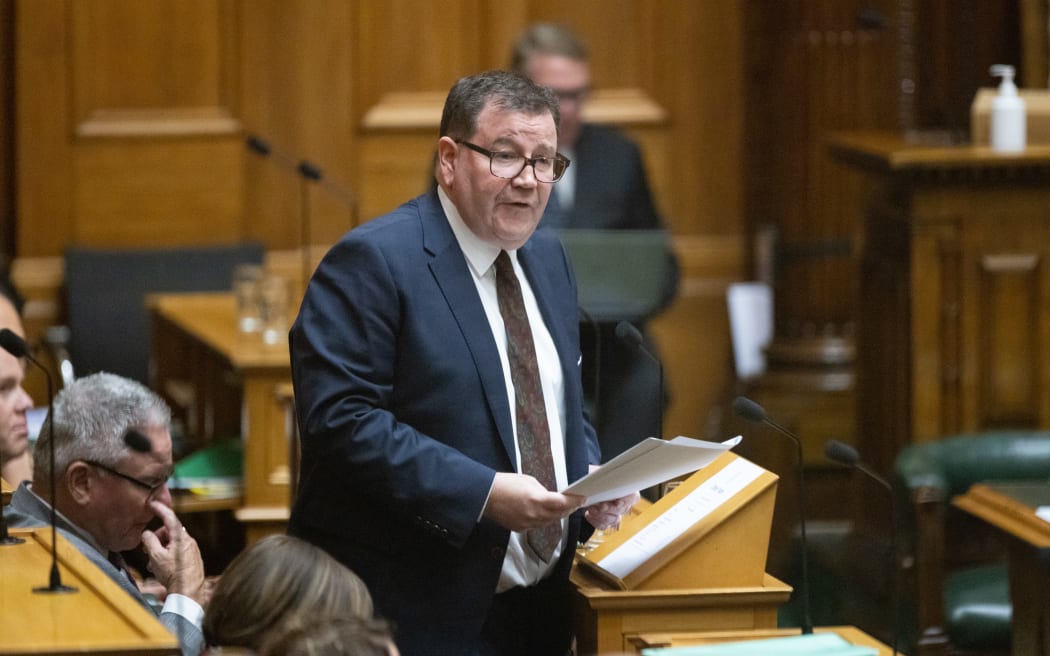
Grant Robertson outlines Budget 2023 Photo: Phil Smith
Each party leader gets to make a 20-minute speech. That is too long a tirade to improvise, a script is required. The party leaders also traditionally get a courtesy-copy of the budget outline an hour before it is announced. But that is not enough time with which to write a good twenty-minute speech, nor form a reasoned opinion. Especially if you consider the enormous scope of any budget.
But how do you write a script denouncing announcements unknown? There are a variety of approaches and this year’s party leaders employed most of them.
The generic approach
The first approach is to pretty much ignore anything the Minister of Finance just announces and go wide, denouncing all and sundry. This was the mainstay of National Party leader Christopher Luxons’ approach.
As the first speaker up after Grant Robertson he has the least time to prepare a specifically crafted, well-reasoned rebuttal so his approach is necessarily limited. Safely, he opted for variations on an ‘everything is terrible and it’s all their fault’ election speech, focusing especially on ‘cost-of-living’ mixed in with broad claims of government failure.
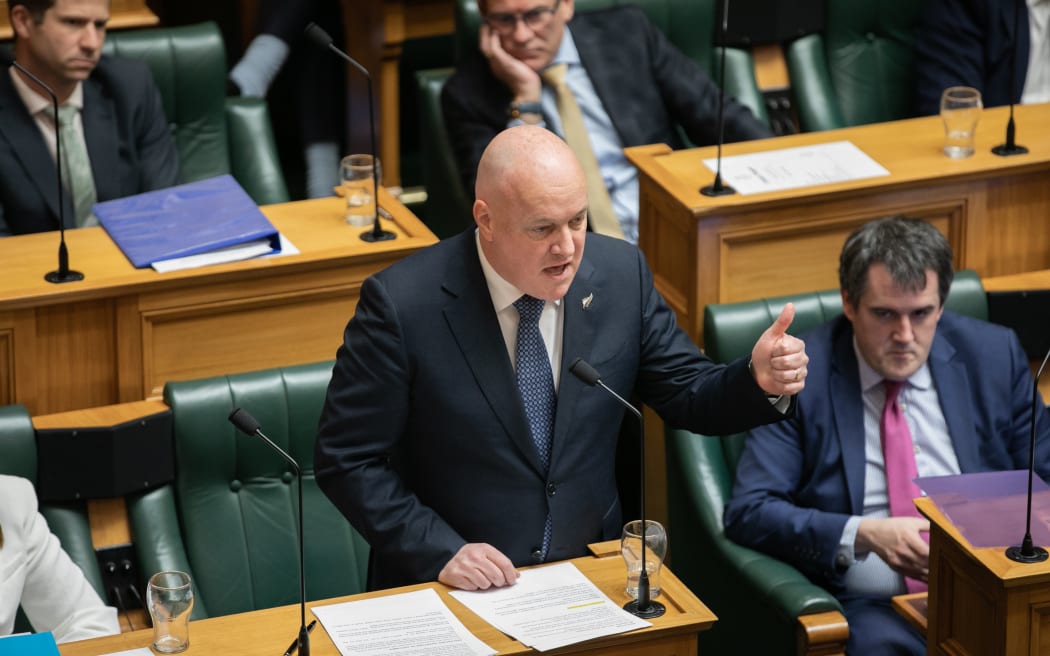
Christopher Luxon during his budget response. Despite appearances, he is not giving Grant Robertson the 'thumbs-up' sign for a job well done. Photo: VNP / Johnny Blades
“Now, this is the "blow-out Budget", and it's just spend more and expect Kiwis to pay for it — that's what it is; that's what we've come to expect. But I'm not surprised. You know, we've had a change of Prime Minister, he's tried to adopt some new language and some new words, but the reality of it is just the same old Labour Government with the same tired, failed approach to running the economy.”
Most of what Christopher Luxon talked about was either broad or not reliant on likely announcements, so it could be pre-written and apply regardless of what was said.
It is a safe approach for someone not experienced enough to rely on improvising a response.
It was also predictable enough that Prime Minister Chris Hipkins’ opening lines were likely also pre-written.
“Budget day is a day for details, a day for plans, a day for vision. We just heard none of those things from the Leader of the Opposition. The biggest blowout that we have seen today was the release of hot air from the Leader of the Opposition opposite. It is no wonder his own colleagues have started to refer to him as ‘Captain Cliché’.”
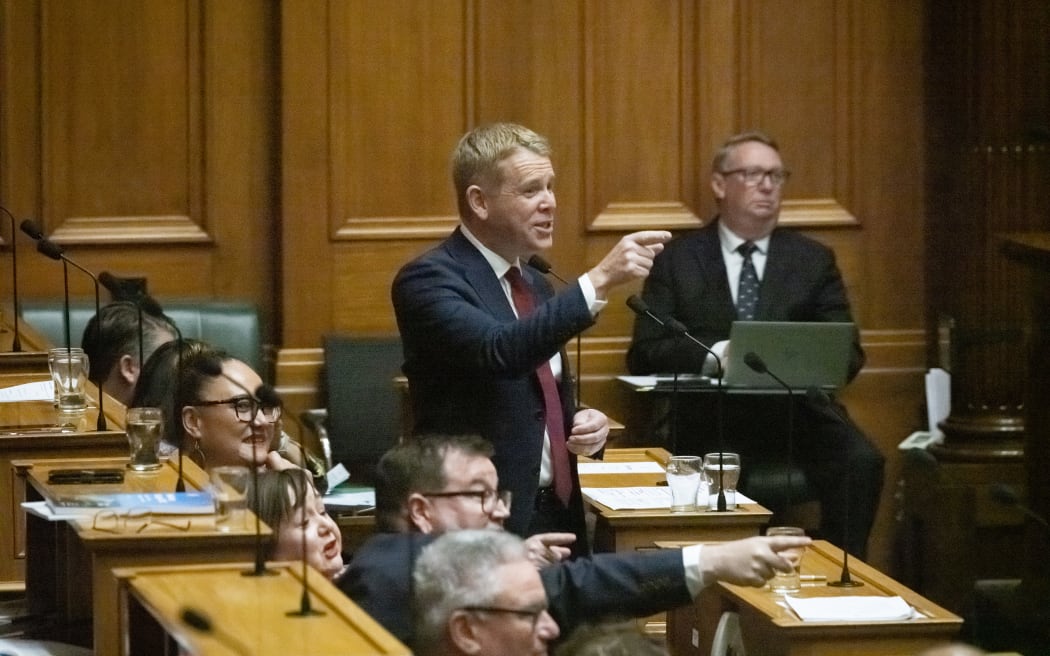
Chris Hipkins and Grant Robertson both point at the ACT Party during the budget debate. Photo: VNP / Phil Smith
The ‘insert detail here’ approach
A second approach is one that leaves some gaps in the speech for details to be added later. In an era of shared document editing a speech can be worked on by a leader’s team up in the office while the leader is in the chamber. They can keep an eye on what is being added so nothing catches them unaware and add some finishing touches themselves.
This approach however relies on either reading off a screen (something that David Seymour often does), or having someone send a chamber attendant in with updated pages as the leader’s speech-time nears.
Of course to avoid any chance of being flummoxed by being handed a speech that isn’t at all what you have been practising, you might just leave a few gaps to jot in some details yourself later. All of the party leaders (whichever their general tactic was), added in a few relevant details from the budget announcement to keep their speeches relevant.
Chris Luxon apparently opted to pencil in some last minute thoughts and details himself.
You can imagine a pre-written speech with places where it says things like “I deplore that the government intends to…[details to be added later]…”. Inevitably, one day a soon-to-unemployed speechwriter will forget to update one of those and a luckless party leader will just read the whole thing out verbatim.
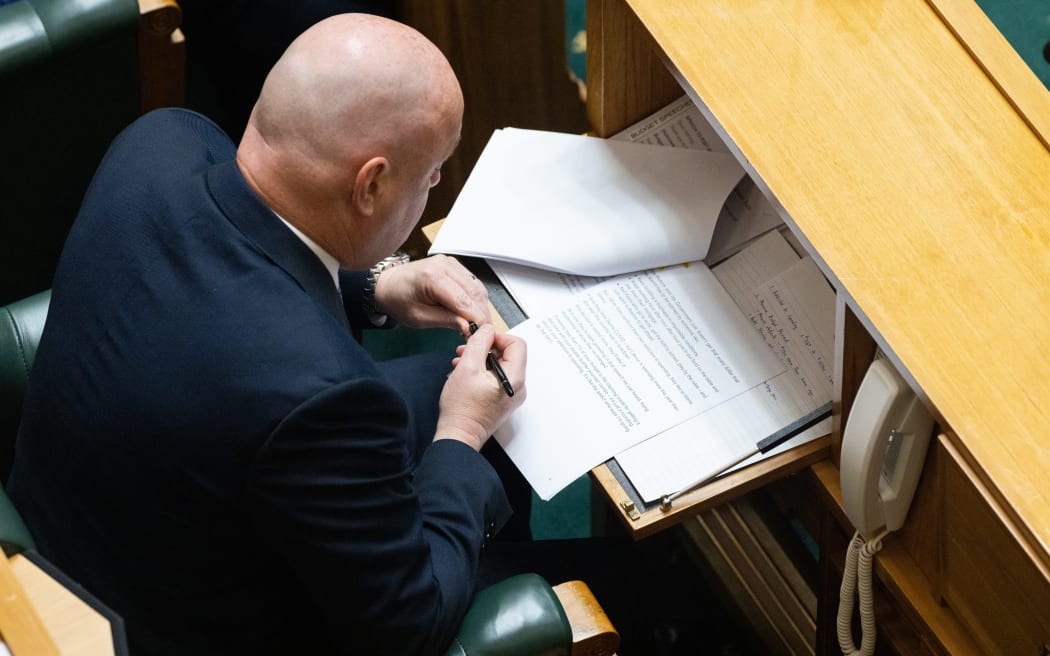
Christopher Luxon adds some last minute details to his Budget Debate speech. Photo: VNP / Phil Smith
An alternative budget
If a party leader wants to go whole hog on their plans prior to an election, the budget debate is an opportunity to get very specific and present the bones of an alternative budget. Smaller parties often do this.
ACT party leader David Seymour took this approach. His speech was - like Chris Hipkins’ - pretty lightly scripted, which gave him the leeway to be quite responsive as well. But the prepared aspects were largely based on an alternative ‘budget’.
“In this country we have taken defence for granted for far too long. We don't live in Helen Clark's benign strategic environment, and that's why ACT's alternative budget would increase defence expenditure to 2% of GDP so that we can play our part and pull our weight in a fully interoperable ANZAC defence force to send a credible message to the rest of the world to back out of the South Pacific.”
Seymour had even brought along a printed copy with a nice coloured cover. All MPs love a prop to wave around - it solves the problem of what to do with your hands.
Regardless of a slightly Potemkin-cover, no opposition has the resources to be very specific in the alt-budget plans. The actual budget is hundreds of pages of detailed spending plans. Behind that are thousands of pages of departmental and ministry Statements of Intent and so on. Alternative budgets aren't real budgets, but they are indications of priorities, indicating the ghostly shape of budget future if they are allowed carte blanche.
Luckily, in politics general statements and broad numbers are far more effective than details. Details can trip you up if someone drills down and tries to make your numbers add up. It is usually safer to focus on the generalities.
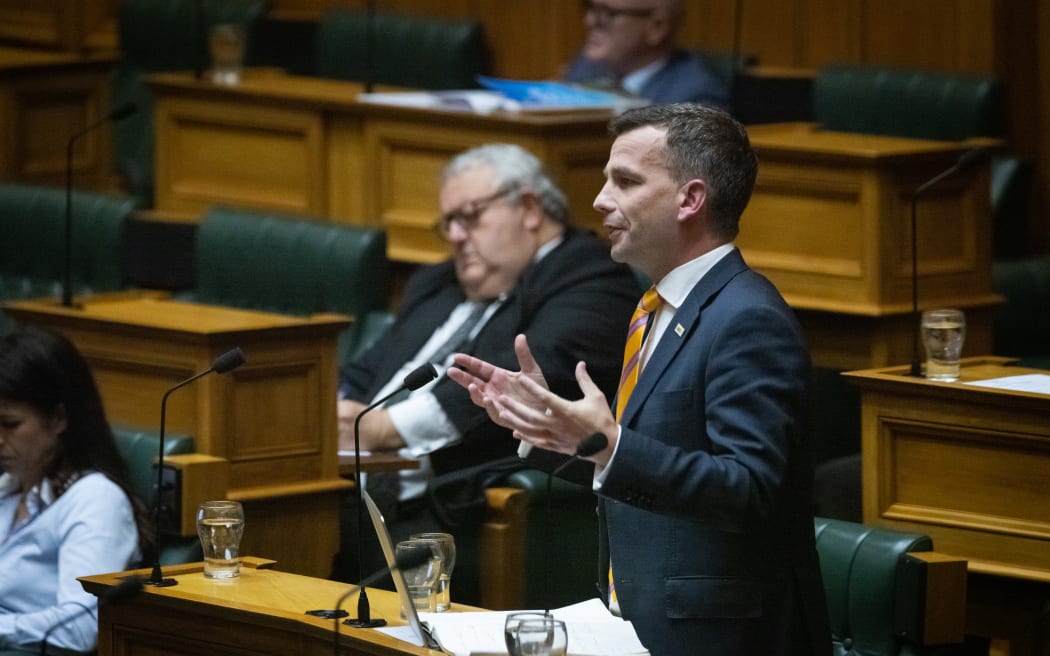
ACT leader David Seymour delivers his budget response. Photo: VNP / Phil Smith
The ‘I have a dream’ budget
There is a huge advantage to not being the government during a budget debate. If you aren’t responsible you never need to get into the weeds of the spending details and don’t need to try to make things balance out. You don’t need to find something to cut to pay for what you want to do.
In short, if you’re not the government you can go large and promise the moon. Marama Davidson spoke for the Green Party and took the ‘I have a dream’ approach to the budget. It has the advantage of listing all the things you would add, but nothing you would take away. You can imagine all the things you would achieve with impunity.
Right off, Marama Davidson noted that… “The Green Party will vote to pass this Budget. It includes some really important steps that will make a huge difference to people's lives.”
But there was so much more she would have done if she ran the circus.
“Is it enough? Not even close. So let me be clear: while we are pleased with large parts of this Budget, we know it still falls a long way short of what is needed. There is so much more that we could have done in this Budget now—not future ones, but now. This was the Budget that could have reduced the outrageous and immoral level of income and wealth inequality we have in this country. It could have been the Budget that confronted climate change with the urgency and the scale that it demands; a Budget that made sure everyone in Aotearoa has what they need to have kai on the table, a safe place to call home, and a live a good life…”
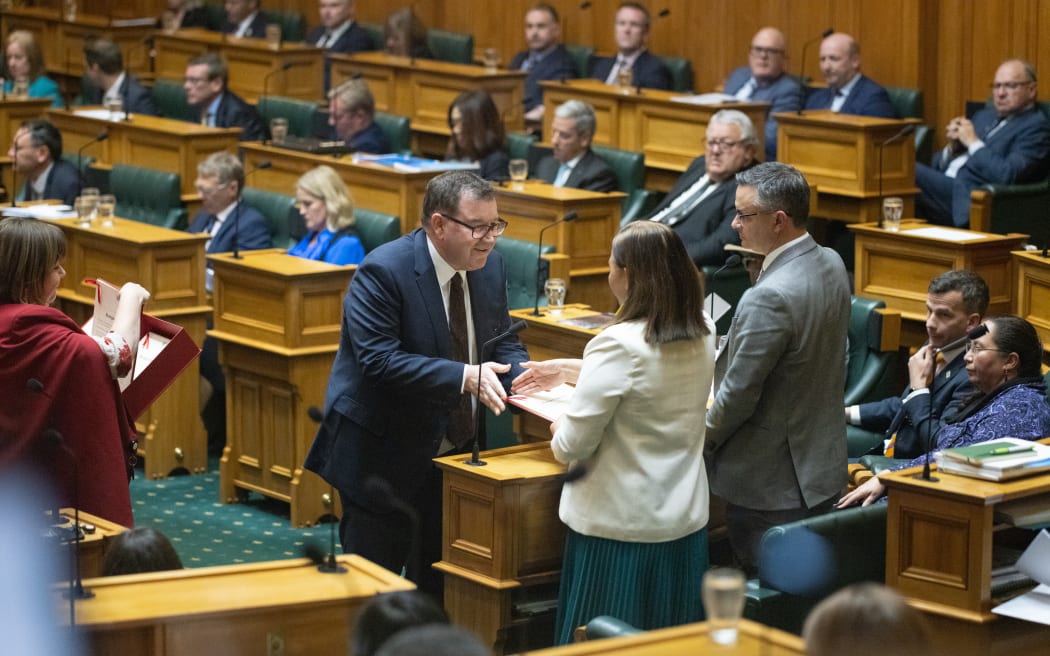
Minister of Finance Grant Robertson hands a copy of the Budget Speech to Green Co-Leader Marama Davidson prior to the delivery of the speech. Photo: VNP / Phil Smith
I have no criticism of this approach. It is politically clever and also serves to remind everyone of further, higher, better objectives, if only we could reach them. No MP would say an outright “no” to the idea of a happier, healthier, wealthier, safer, electorate.
After nearly two and a half hours of pointing and promising, acclaiming and deploring, applauding and even occasionally laughing, the party leaders packed up their soap boxes and left the chamber for the other MPs. (Actually mostly they departed once they spoke, to rush off to share their budget responses with various media.) At that point the Budget Debate itself was put on hold for later.
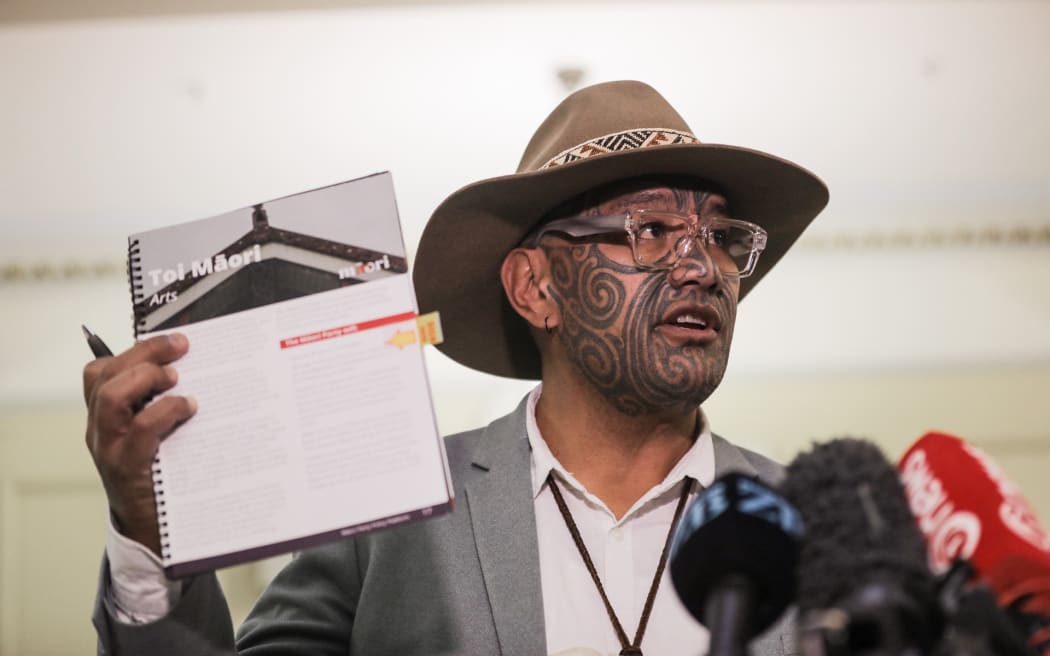
Rawiri Waititi from Te Pati Maori also came prepared with his own party's spending plan. Photo: RNZ / Samuel Rillstone


